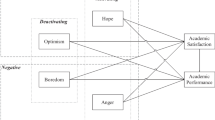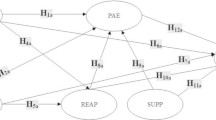Abstract
Research has demonstrated that lay beliefs about emotions (i.e., whether they are viewed as malleable or fixed) may shape important outcomes in educational performance. Given the prominent role of emotions in learning and goal setting, the present study examined whether emotion beliefs moderated (1) the relationship between the experience of academic emotions and grades and (2) the relationship between academic emotions and shifts in goal setting. Undergraduate students (N =329) enrolled in an introductory psychology course reported on their emotions and goal orientations across two waves of data collection which took place before and after their first two exams. Multiple regression analyses revealed that emotion beliefs moderated the relationship between academic emotions and changes in goal orientation across the semester. Specifically, greater experience of negative outcome-related emotions was associated with decreases in mastery- and performance-avoidance goal orientations among individuals who tended to view emotions as more malleable. On the other hand, for students who felt their emotions were more fixed, change in avoidance goals was not influenced by negative outcome emotions. Our results point to the added benefit in students viewing emotions as malleable, as this perspective may lead to students disengaging less with course material (i.e., decreasing avoidance goal orientations) after learning experiences marked by negative emotions. Overall, our findings provide preliminary support for the inclusion of emotion beliefs in models of academic achievement.




Similar content being viewed by others
Notes
Although prior work has not demonstrated gender to be consistently related to emotion beliefs or achievement emotions, we examined the correlation of gender with all the variables in Table 3. The only variable gender was significantly related to was emotion beliefs (r = .14, p = .009), with women having greater incremental/malleable beliefs than men. Gender was also marginally correlated with the Shipley-2 (r = -.11, p = .052). Given that emotion beliefs was a key variable in all our analyses, we ran all of our primary analyses with gender included as a covariate. Our results and their interpretations were unchanged and therefore we report our results without including gender for the sake of parsimony.
References
Albrecht Soto, S., Salomaa, A. &, Soto, J. A. (2022). Minority status, diversity climate, and emotion beliefs predict outcomes of well-being. Poster presented at the Emotion Pre Conference of the Society of Personality and Social Psychology; San Francisco, CA (virtual presentation).
Aronson, J., Fried, C. B., & Good, C. (2002). Reducing the effects of stereotype threat on African American college students by sha** theories of intelligence. Journal of Experimental Social Psychology, 38(2), 113–125. https://doi.org/10.1006/jesp.2001.1491
Blackwell, L. S., Trzesniewski, K. H., & Dweck, C. S. (2007). Implicit theories of intelligence predict achievement across an adolescent transition: A longitudinal study and an intervention. Child Development, 78(1), 246–263. https://doi.org/10.1111/j.1467-8624.2007.00995.x
Brophy, J. (2005). Goal theorists should move on from performance goals. Educational Psychologist, 40, 167–176. https://doi.org/10.1207/s15326985ep4003_3
Cervone, D. (2004). The architecture of personality. Psychological review, 111(1), 183–204. https://doi.org/10.1037/0033-295X.111.1.183
Church, M. A., Elliot, A. J., & Gable, S. L. (2001). Perceptions of classroom environment, achievement goals, and achievement outcomes. Journal of Educational Psychology, 93(1), 43–54. https://doi.org/10.1037/0022-0663.93.1.43
Daniels, L. M., Haynes, T. L., Stupinsky, R. H., Perry, R. P., Newall, N. E., & Pekrun, R. (2007). Individual differences in achievement goals: A longitudinal study of cognitive, emotional, and achievement outcomes. Contemporary Educational Psychology, 33, 584–608. https://doi.org/10.1016/j.cedpsych.2007.08.002
Deci, E. L., & Ryan, R. M. (2008). Self-determination theory: A macrotheory of human motivation, development, and health. Canadian Psychology/Psychologie canadienne, 49(3), 182–185. https://doi.org/10.1037/a0012801
Dweck, C. S. (1986). Motivational processes affecting learning. American Psychologist, 41(10), 1040–1048. https://doi.org/10.1037/0003-066X.41.10.1040
Dweck, C. S., & Leggett, E. L. (1988). A social-cognitive approach to motivation and personality. Psychological Review, 95(2), 256–273. https://doi.org/10.1037/0033-295X.95.2.256
Edwards, O. V. (2014). Differentiating performance approach goals and their unique effects. Universal Journal of Educational Research, 2(2), 134–145. https://doi.org/10.13189/ujer.2014.02020
Elliot, A. J., & Church, M. A. (1997). A hierarchical model of approach and avoidance achievement motivation. Journal of Personality and Social Psychology, 72(1), 218–232. https://doi.org/10.1037/0022-3514.72.1.218
Elliot, A. J., & McGregor, H. A. (2001). A 2 × 2 achievement goal framework. Journal of Personality and Social Psychology, 80(3), 501–519. https://doi.org/10.1037/0022-3514.80.3.501
Elliot, A. J., & Murayama, K. (2008). On the measurement of achievement goals: Critique, illustration, and application. Journal of Educational Psychology, 100(3), 613–628. https://doi.org/10.1037/0022-0663.100.3.613
Elliot, A. J., & Thrash, T. M. (2002). Approach-avoidance motivation in personality: Approach and avoidance temperaments and goals. Journal of Personality and Social Psychology, 82(5), 804–818. https://doi.org/10.1037/0022-3514.82.5.804
Elliot, A. J., McGregor, H. A., & Gable, S. (1999). Achievement goals, study strategies, and exam performance: A mediational analysis. Journal of Educational Psychology, 91(3), 549–563. https://doi.org/10.1037/0022-0663.91.3.549
George, D., & Mallery, P. (2003). SPSS for Windows step by step: A simple guide and reference. 11.0 update (4th ed.). Allyn & Bacon.
Goetz, T., Frenzel, A. C., Pekrun, R., Hall, N. C., & Lüdtke, O. (2007). Between-and within-domain relations of students’ academic emotions. Journal of Educational Psychology, 99(4), 715–733. https://doi.org/10.1037/0022-0663.99.4.715
Harackiewicz, J. M., Barron, K. E., Tauer, J. M., & Elliot, A. J. (2002). Predicting success in college: A longitudinal study of achievement goals and ability measures as predictors of interest and performance from freshman year through graduation. Journal of Educational Psychology, 94(3), 562–575. https://doi.org/10.1037/0022-0663.94.3.562
Kappes, A., & Schikowski, A. (2013). Implicit theories of emotion shape regulation of negative affect. Cognition & Emotion, 27(5), 952–960. https://doi.org/10.1080/02699931.2012.753415
Kaplan, A., & Maehr, M. L. (2007). The contributions and prospects of goal orientation theory. Educational Psychology Review, 19, 141–184. https://doi.org/10.1007/s10648-006-9012-5
Ketonen, E., & Lonka, K. (2012). Do situational academic emotions predict academic outcomes in a lecture course? Procedia-Social and Behavioral Sciences, 69, 1901–1910. https://doi.org/10.1016/j.sbspro.2012.12.144
Linnenbrink, E. A., & Pintrich, P. R. (2002). Achievement goal theory and affect: An asymmetrical bidirectional model. Educational psychologist, 37(2), 69–78. https://doi.org/10.1207/S15326985EP3702_2
Meece, J. L., & Holt, K. (1993). A pattern analysis of students’ achievement goals. Journal of educational psychology, 85(4), 582–590. https://doi.org/10.1037/0022-0663.85.4.582
Pekrun, R., Goetz, T., Titz, W., & Perry, R. P. (2002). Academic emotions in students’ self-regulated learning and achievement: A program of qualitative and quantitative research. Educational Psychologist, 37(2), 91–105. https://doi.org/10.1207/S15326985EP3702_4
Pekrun, R., Elliot, A. J., & Maier, M. A. (2006). Achievement goals and discrete achievement emotions: A theoretical model and prospective test. Journal of educational Psychology, 98(3), 583–597. https://doi.org/10.1037/0022-0663.98.3.583
Pekrun, R., Elliot, A. J., & Maier, M. A. (2009). Achievement goals and achievement emotions: Testing a model of their joint relations with academic performance. Journal of Educational Psychology, 101(1), 115–135. https://doi.org/10.1037/a0013383
Pekrun, R., Goetz, T., Frenzel, A. C., Barchfeld, P., & Perry, R. (2011). Measuring emotions in students’ learning and performance: The Achievement Emotions Questionnaire (AEQ). Contemporary Educational Psychology, 36, 36–48. https://doi.org/10.1016/j.cedpsych.2010.10.002
Pintrich, P. R. (2000). Multiple goals, multiple pathways: The role of goal orientation in learning and achievement. Journal of educational psychology, 92(3), 544–555. https://doi.org/10.1037/0022-0663.92.3.544
Putwain, D. W., Larkin, D., & Sander, P. (2013). A reciprocal model of achievement goals and learning related emotions in the first year of undergraduate study. Contemporary Educational Psychology, 38(4), 361–374. https://doi.org/10.1016/j.cedpsych.2013.07.003
R Core Team. (2017). R: A language and environment for statistical computing. R Foundation for Statistical Computing, Vienna, Austria. https://www.R-project.org/. Accessed 21 May 2024
Salomaa, A. C. & Veilleux, J. C. (2015). Sexual/gender minority status moderates the impact of beliefs about emotion on anxiety. Poster presented at the annual meeting of the International Convention of Psychological Science, Amsterdam, the Netherlands
Shipley, W. C., Gruber, C. P., Martin, T. A., & Klein, A. M. (2009). Shipley-2. Western Psychological Services, Los Angeles, CA: Western Psychological Services.
Sideridis, G. D. (2003). On the origins of helpless behavior of students with learning disabilities: Avoidance motivation? International Journal of Educational Research, 39(4), 497–517. https://doi.org/10.1016/j.ijer.2004.06.011
Sideridis, G. D. (2005). Goal Orientation, Academic Achievement, and Depression: Evidence in Favor of a Revised Goal Theory Framework. Journal of Educational Psychology, 97(3), 366–375. https://doi.org/10.1037/0022-0663.97.3.366
Tamir, M., John, O. P., Srivastava, S., & Gross, J. J. (2007). Implicit theories of emotion: Affective and social outcomes across a major life transition. Journal of Personality and Social Psychology, 92(4), 731–744. https://doi.org/10.1037/0022-3514.92.4.731
Touré-Tillery, M., & Fishbach, A. (2017). Three sources of motivation. Consumer Psychology Review, 2017, 1–12. https://doi.org/10.1002/arcp.1007
Tukey, J. W. (1977). Exploratory data analysis. Reading, Massachusetts: Addison-Wesley.
Urdan, T. (2004). Predictors of Academic Self-Handicap** and Achievement: Examining Achievement Goals, Classroom Goal Structures, and Culture. Journal of Educational Psychology, 96(2), 251–264. https://doi.org/10.1037/0022-0663.96.2.251
Van Yperen, N. W., Elliot, A. J., & Anseel, F. (2009). The influence of mastery- avoidance goals on performance improvement. European Journal of Social Psychology, 39(6), 932–943. https://doi.org/10.1002/ejsp.590
Veilleux J. C., Warner, E. A., Baker, D. E., Chamberlain, K. D. (2021). Beliefs about emotion shift dynamically alongside momentary affect. Journal of Personality Disorders, 35(Suppl A):83–113. https://doi.org/10.1521/pedi_2020_34_491
Watson, D., & Clark, L. A. (1999). The PANAS-X: Manual for the positive and negative affect schedule-expanded form. http://www.psychology.uiowa.edu/Faculty/Watson/Watson.html
Zimmerman, B. J., Bandura, A., & Martinez-Pons, M. (1992). Self-motivation for academic attainment: The role of self-efficacy beliefs and personal goal setting. American Educational Research Journal, 29(3), 663–676.
Funding
The authors did not receive support from any organization for the submitted work
Author information
Authors and Affiliations
Corresponding author
Ethics declarations
Ethical approval
All procedures performed in studies involving human participants were in accordance with the ethical standards of the institutional and/or national research committee and with the 1964 Helsinki declaration and its later amendments or comparable ethical standards.
Informed consent
Informed consent was obtained from all individual participants included in the study.
Conflict of Interest
Anna C. Salomaa declares that she has no conflict of interest. José A. Soto declares that he has no conflict of interest.
Additional information
Publisher's Note
Springer Nature remains neutral with regard to jurisdictional claims in published maps and institutional affiliations.
Supplementary Information
Below is the link to the electronic supplementary material.
Rights and permissions
Springer Nature or its licensor (e.g. a society or other partner) holds exclusive rights to this article under a publishing agreement with the author(s) or other rightsholder(s); author self-archiving of the accepted manuscript version of this article is solely governed by the terms of such publishing agreement and applicable law.
About this article
Cite this article
Soto, J.A., Salomaa, A.C. & Daas, R. Emotion beliefs and goal setting: Malleability of emotion predicts changes in goal orientation across a semester. Motiv Emot (2024). https://doi.org/10.1007/s11031-024-10074-1
Accepted:
Published:
DOI: https://doi.org/10.1007/s11031-024-10074-1




